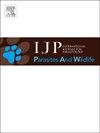Influence of latitude, host body size and host body weight on helminth species richness and abundance in two Neotropical marsupials
IF 2.2
3区 医学
Q3 ECOLOGY
International Journal for Parasitology-Parasites and Wildlife
Pub Date : 2025-05-06
DOI:10.1016/j.ijppaw.2025.101077
引用次数: 0
Abstract
Parasite species richness can be influenced by intrinsic and extrinsic factors of their hosts, such as host body size and latitude. Although these factors have been studied for several taxa, few studies have investigated them for helminths of wild mammals. The aim of this study was to evaluate the influence of host body size, body weight and latitude on the species richness and abundance of the helminths of Didelphis aurita and Didelphis albiventris. Data on helminths and the geographic coordinates of the collection localities of the hosts were obtained from the Collection of Wild Mammal Reservoirs and the database of the Laboratory of Biology and Parasitology of Wild Mammal Reservoirs. The influences of latitude and host body size and body weight on helminth species richness (HSR) and helminth abundance were analysed using linear regressions. We evaluated the effect of latitude on helminth species composition using redundancy analysis followed by ANOVA. The HSR ranged from 1 to 9 for D. aurita and from 1 to 7 for D. albiventris. We found a positive relationship between latitude and total HSR for D. aurita (p = 0.012). The ANOVA revealed the influence of latitudinal variation on the species composition variation of helminths only for D. aurita (p = 0.001). With respect to body size, we did not find a significant relationship between this variable and HSR or abundance for either species. However, we found a positive relationship between host body weight and helminth abundance for D. aurita (p = 0.004). We conclude that the increase in latitude was an explanatory factor for the increasing HSR along infracommunities, contradicting the general pattern of increasing species with decreasing latitude observed in free-living species. Moreover, host intrinsic factors may be more relevant to endoparasite occurrence and development than latitude because they directly influence the parasite niche.

纬度、寄主体型和寄主体重对两种新热带有袋类蠕虫物种丰富度和丰度的影响
寄生物种丰富度受寄主的内在和外在因素的影响,如寄主的体型和纬度。虽然这些因素已经在一些分类群中进行了研究,但很少有研究对野生哺乳动物的蠕虫进行了调查。本研究的目的是评价寄主体型、体重和纬度对白腹蓟马(Didelphis aurita)和白腹蓟马(Didelphis albiventris)蠕虫种类丰富度和丰度的影响。寄生虫数据和寄主采集地地理坐标来源于《野生哺乳动物库》和《野生哺乳动物库生物学与寄生虫学实验室》数据库。采用线性回归分析了纬度和寄主体大小、体质量对线虫物种丰富度和丰度的影响。我们使用冗余分析和方差分析来评估纬度对蠕虫物种组成的影响。aurita的HSR为1 ~ 9,albiventris的HSR为1 ~ 7。我们发现纬度与aurita的总HSR呈正相关(p = 0.012)。方差分析显示,纬度变化只对乌氏夜蛾的种类组成变化有影响(p = 0.001)。在体型方面,我们没有发现这一变量与两种物种的HSR或丰度之间存在显著关系。然而,我们发现寄主体重与aurita寄生虫丰度呈正相关(p = 0.004)。我们认为纬度的增加是基础群落高通量增加的一个解释因素,这与自由生活物种随纬度的降低而增加的一般模式相矛盾。此外,与纬度相比,宿主内在因素可能与寄生虫的发生和发展更为相关,因为它们直接影响寄生虫的生态位。
本文章由计算机程序翻译,如有差异,请以英文原文为准。
求助全文
约1分钟内获得全文
求助全文
来源期刊

International Journal for Parasitology-Parasites and Wildlife
Medicine-Infectious Diseases
CiteScore
3.80
自引率
5.60%
发文量
113
审稿时长
45 days
期刊介绍:
The International Journal for Parasitology: Parasites and Wildlife (IJP-PAW) publishes the results of original research on parasites of all wildlife, invertebrate and vertebrate. This includes free-ranging, wild populations, as well as captive wildlife, semi-domesticated species (e.g. reindeer) and farmed populations of recently domesticated or wild-captured species (e.g. cultured fishes). Articles on all aspects of wildlife parasitology are welcomed including taxonomy, biodiversity and distribution, ecology and epidemiology, population biology and host-parasite relationships. The impact of parasites on the health and conservation of wildlife is seen as an important area covered by the journal especially the potential role of environmental factors, for example climate. Also important to the journal is ''one health'' and the nature of interactions between wildlife, people and domestic animals, including disease emergence and zoonoses.
 求助内容:
求助内容: 应助结果提醒方式:
应助结果提醒方式:


